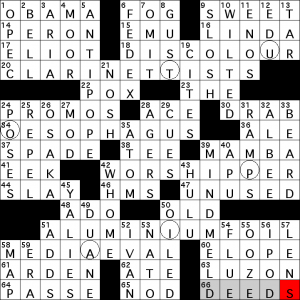meta 0:10
 hello and welcome to episode #679 of matt gaffney’s weekly crossword contest, “More to Read”. this week 1 puzzle is a guest puzzle by the incomparable patrick berry, recently awarded the 2021 merl reagle award for lifetime achievement in crossword constructing. anyway, i attempted this puzzle without the instructions, as usual on a week 1. what are the theme answers? the six longest across answers all featured a british english spelling in both clue and answer:
hello and welcome to episode #679 of matt gaffney’s weekly crossword contest, “More to Read”. this week 1 puzzle is a guest puzzle by the incomparable patrick berry, recently awarded the 2021 merl reagle award for lifetime achievement in crossword constructing. anyway, i attempted this puzzle without the instructions, as usual on a week 1. what are the theme answers? the six longest across answers all featured a british english spelling in both clue and answer:
- {Change the hue of, as clothing fibres} DISCOLOUR. over on this side of the pond, we don’t need the U, and we also spell “fibers” with the E before the R.
- {Their instruments are sometimes called “liquorice sticks”} CLARINETTISTS. licorice/CLARINETISTS to americans.
- {Connexion between the throat and stomach} OESOPHAGUS. connection/ESOPHAGUS. do brits put an S phoneme in the pronunciation of “connexion”? maybe they do. i certainly don’t when i say “connection”; it’s conneck + shun.
- {Religious sceptic’s opposite} WORSHIPPER. skeptic/WORSHIPPER. there’s a stronger argument to be made for doubling the T in CLARINETTISTS (because “net” is the stressed syllable) than doubling the P here.
- {Wrap that prevents mould from forming} ALUMINIUM FOIL. mold/ALUMINUM. i have no idea why this is both spelled (spelt) and pronounced differently. many elements end with -nium; a few others (lanthanum, molybdenum, platinum) end with just -num. aluminum fits into one group or the other depending on which kind of english you speak.
- {Like pre-Renaissance civilisation} MEDIAEVAL. civilization/MEDIEVAL.
in each case, the british spelling of the answer contains exactly one extra letter that needs to be removed to recover the american spelling. taking those letters in order gives UTOPIA, which … well, at least it makes the title make sense, as it’s a philosophical novel by thomas more. is there some other, cleverer connection between UTOPIA and the theme of the puzzle? i don’t know. i do know that more was an english author, and that “utopia” is derived from the greek for “no place”. maybe america is the utopia where these useless extra letters do not need to appear in our orthography.
in the fill, i enjoyed seeing {Competing claimant to the Diocese of Rome} ANTIPOPE, especially since it showed up as a memorable correct answer in last night’s jeopardy! episode involving fellow fiend blogger derek allen. (derek played great, but alas, he was not the contestant who got that clue right for $2000.) {Get-together with Mr. Spock?} MIND MELD was also fun.
that’s all i’ve got this week. how’d you all like this one?
Thanks, Joon — 692 correct answers this week, and 0 incorrect! A perfect Week 1.
One other elegance that I’m sure joon noticed but I’d like to make sure others do as well: the 12 spelling changes Patrick used (6 in grid, 6 in clued) are all unique, i.e. he didn’t reuse one. The liquorice/clarinettists find is particularly nice.
Well, the extra letter in each theme word also gives you more to read.
I’m curious what the seed idea was for this one. Both “extra letters in cross-pond English” and “[Thomas] More to Read” make such excellent starting concepts on their own that the fusion of them in one meta seems remarkable to this non-constructor.
I thought the meta was referring to the [excellent, but exceptionally dark] British television series and the recent [less excellent, and less dark] Amazon Prime version. I spent the weekend thinking that this was a questionable and uncharacteristic choice on Mr. Berry’s and Gaffney’s parts.
So, yeah, Thomas More makes more sense :-0
I don’t understand WORSHIPPER. It’s never seen with a single P in the US.
“never” is certainly an overstatement; my new oxford american dictionary lists worshiper as the main entry and worshipper as the variant. however, m-w has it the other way around with “less commonly” explicitly attached to the one-p variant. so this criticism has some merit.